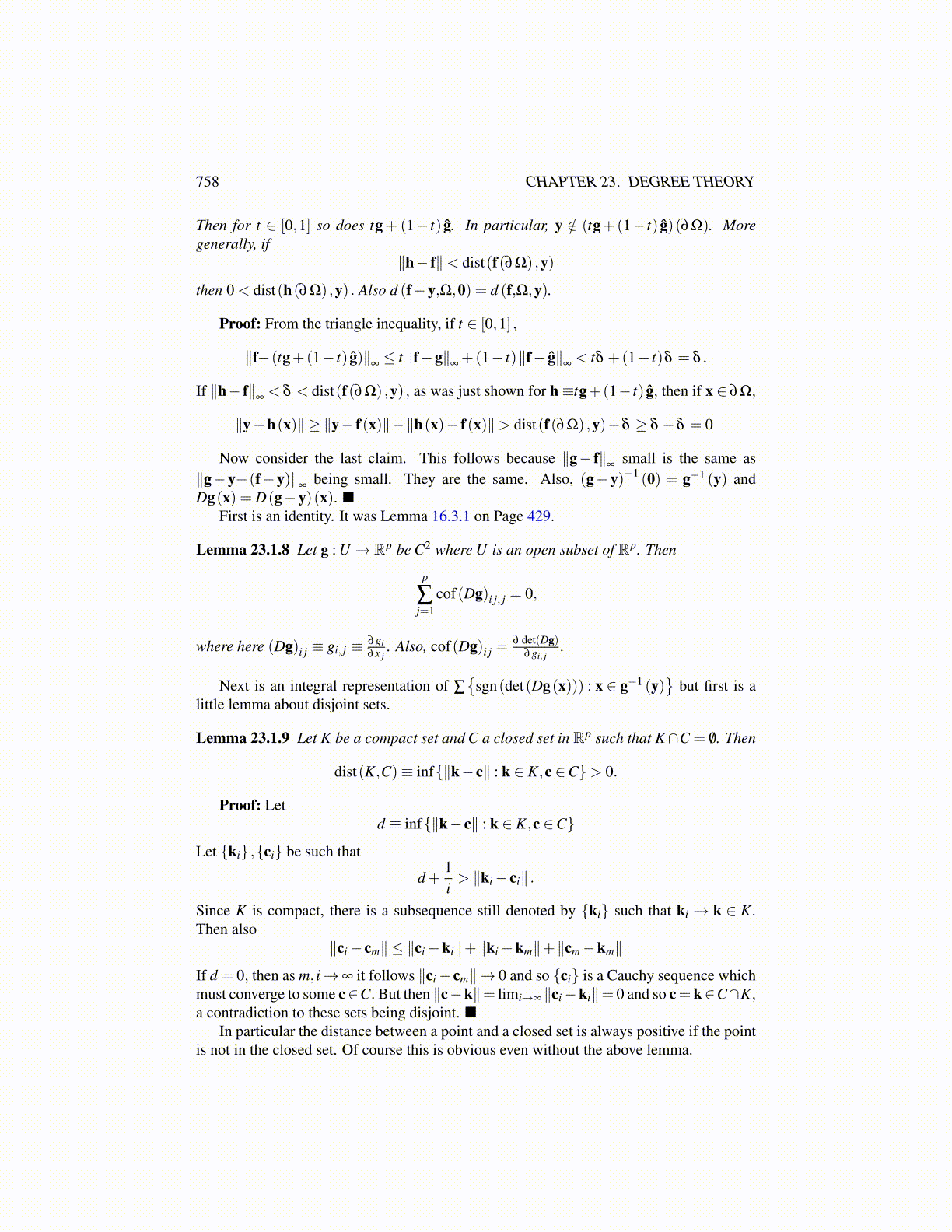
758 CHAPTER 23. DEGREE THEORY
Then for t ∈ [0,1] so does tg+ (1− t) ĝ. In particular, y /∈ (tg+(1− t) ĝ)(∂Ω). Moregenerally, if
∥h− f∥< dist(f(∂Ω) ,y)
then 0 < dist(h(∂Ω) ,y) . Also d (f−y,Ω,0) = d (f,Ω,y).
Proof: From the triangle inequality, if t ∈ [0,1] ,
∥f−(tg+(1− t) ĝ)∥∞≤ t ∥f−g∥
∞+(1− t)∥f− ĝ∥
∞< tδ +(1− t)δ = δ .
If ∥h− f∥∞< δ < dist(f(∂Ω) ,y) , as was just shown for h≡tg+(1− t) ĝ, then if x ∈ ∂Ω,
∥y−h(x)∥ ≥ ∥y− f(x)∥−∥h(x)− f(x)∥> dist(f(∂Ω) ,y)−δ ≥ δ −δ = 0
Now consider the last claim. This follows because ∥g− f∥∞
small is the same as∥g−y−(f−y)∥
∞being small. They are the same. Also, (g−y)−1 (0) = g−1 (y) and
Dg(x) = D(g−y)(x).First is an identity. It was Lemma 16.3.1 on Page 429.
Lemma 23.1.8 Let g : U → Rp be C2 where U is an open subset of Rp. Then
p
∑j=1
cof(Dg)i j, j = 0,
where here (Dg)i j ≡ gi, j ≡ ∂gi∂x j
. Also, cof(Dg)i j =∂ det(Dg)
∂gi, j.
Next is an integral representation of ∑{
sgn(det(Dg(x))) : x ∈ g−1 (y)}
but first is alittle lemma about disjoint sets.
Lemma 23.1.9 Let K be a compact set and C a closed set in Rp such that K∩C = /0. Then
dist(K,C)≡ inf{∥k− c∥ : k ∈ K,c ∈C}> 0.
Proof: Letd ≡ inf{∥k− c∥ : k ∈ K,c ∈C}
Let {ki} ,{ci} be such that
d +1i> ∥ki− ci∥ .
Since K is compact, there is a subsequence still denoted by {ki} such that ki → k ∈ K.Then also
∥ci− cm∥ ≤ ∥ci−ki∥+∥ki−km∥+∥cm−km∥
If d = 0, then as m, i→∞ it follows ∥ci− cm∥→ 0 and so {ci} is a Cauchy sequence whichmust converge to some c∈C. But then ∥c−k∥= limi→∞ ∥ci−ki∥= 0 and so c= k∈C∩K,a contradiction to these sets being disjoint.
In particular the distance between a point and a closed set is always positive if the pointis not in the closed set. Of course this is obvious even without the above lemma.